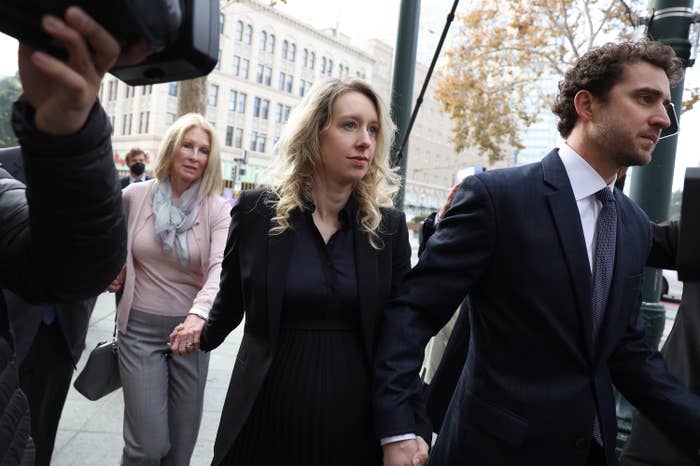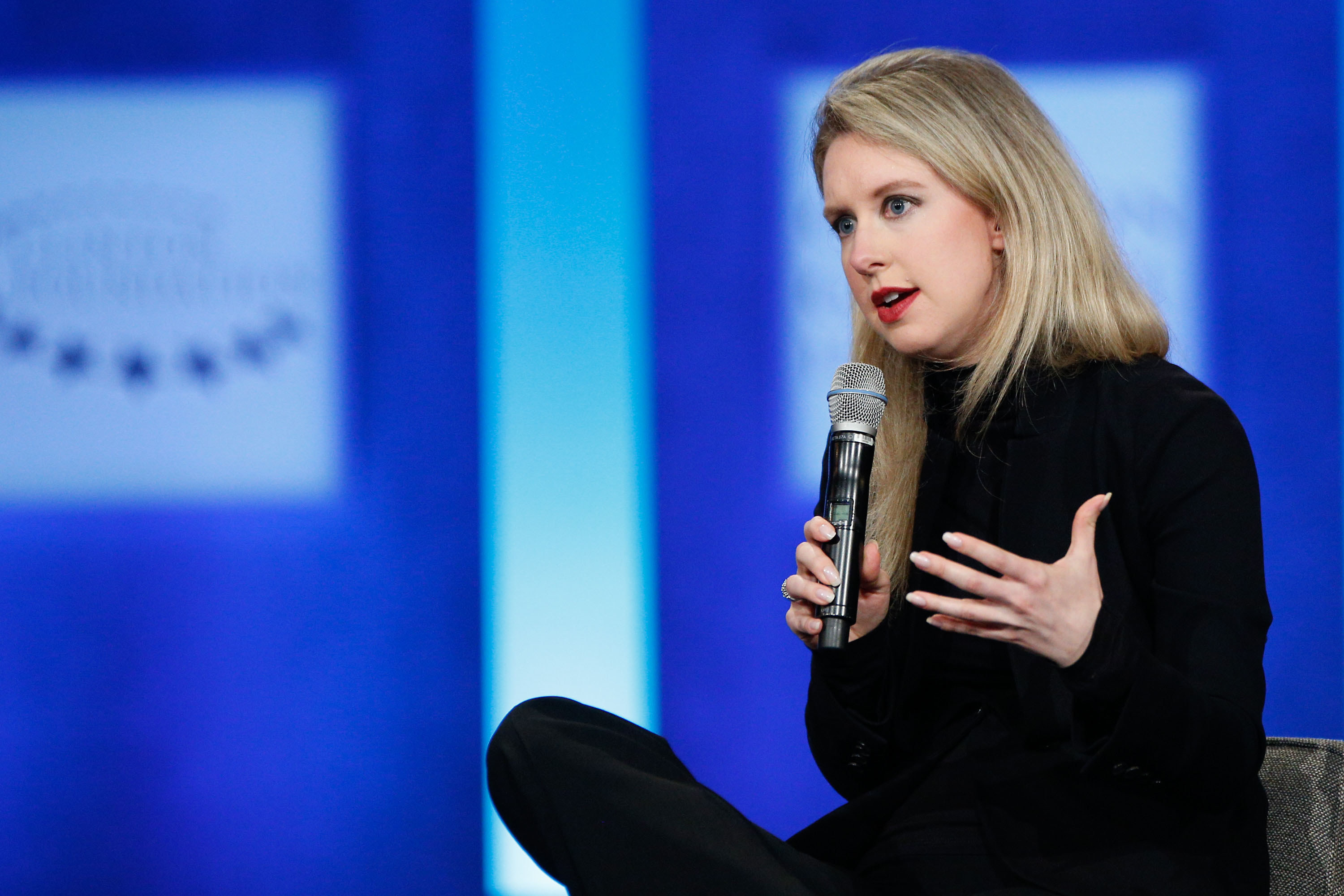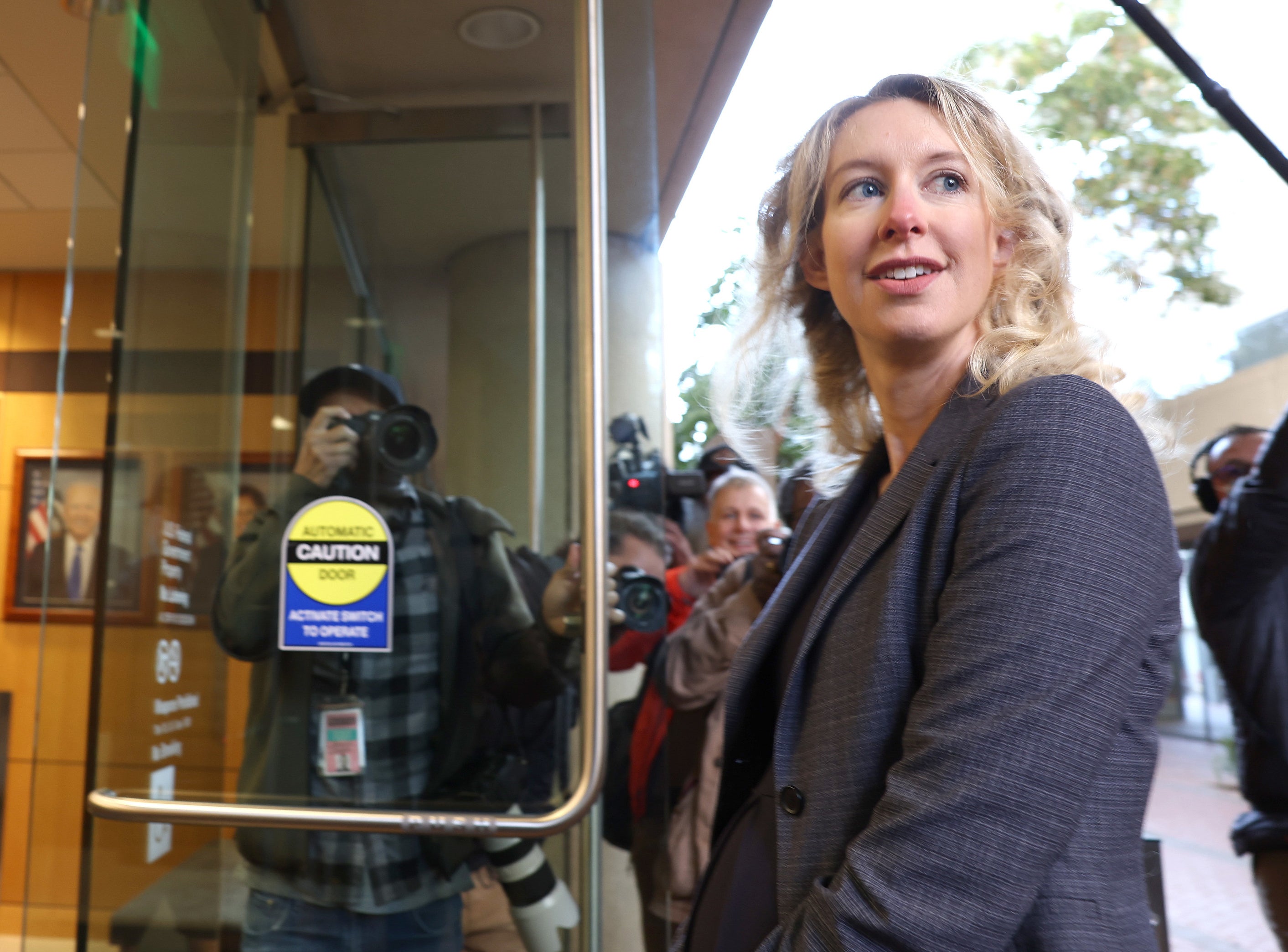
SAN JOSE, California — Theranos founder Elizabeth Holmes was sentenced to more than 11 years in federal prison Friday for defrauding investors with misleading and false statements about the capabilities of her company’s blood-testing technology.
Holmes, the former Silicon Valley executive who sought to revolutionize healthcare with a device she claimed could make medical diagnoses using just a fingerprick of blood, will now report to prison on April 27, 2023, to begin her 135-month sentence. US District Judge Edward Davila said he would set a future hearing to determine what restitution Holmes should pay and did not order her to pay any fines.
“The tragedy of this case is it’s, um, Ms. Holmes is brilliant,” Davila said. “She had creative ideas. She’s a big thinker. She was a woman moving into an industry that is dominated, let's face it, by male ego.”
Holmes, 38, is pregnant, though it’s not clear how far along she is or whether she will give birth before she is forced to surrender to custody. Federal guidelines don’t address what to do when a defendant is pregnant or a parent of a young child, former federal prosecutor Diane Birnholz told BuzzFeed News, so it was entirely up to the judge to determine whether and how to weigh the potential impact sending her to prison would have on her children.
“This is a really complicated tricky issue, and there are no easy answers,” Birnholz said. “It's a terrible situation for the children involved.”
Davila did not mention Holmes's pregnancy or her being a mother as he discussed his thoughts on the case before announcing his decision. He agreed with Holmes's attorneys that she was not motivated by financial greed as he wondered whether it was the "intoxication of the fame that comes with being a young entrepreneur" that caused her to make poor decisions.
"Was there a loss of a moral compass here?" Davila said.
Her long-awaited sentence comes 10 months after a jury found her guilty of four counts of conspiracy to defraud and defrauding investors, including the family of former education secretary Betsy DeVos. Jurors acquitted her on four charges of conspiring to defraud and defrauding paying patients. They did not reach a verdict on three other charges.
The court also sentenced her to three years of supervised release for each of the four counts to be served concurrently following her time in prison.
Before learning her sentence, Holmes delivered a statement to the court through tears, saying that she accepted responsibility for Theranos, what she described as her “life’s work.”
“In looking back, there are so many things I would do differently if I had the chance,” said Holmes, dressed in all black as she stood before the judge. “I tried to realize my dream too quickly and did too many things at the same time. I regret my failings with every cell in my body.”
Still, Holmes’s remarks fell short of actually admitting any wrongdoing or taking responsibility for her criminal conduct.

Holmes, whose attempts to get a new trial were recently denied, is expected to appeal her conviction and her sentence. After learning her fate, Holmes cried as her friends and family surrounded her. She did not speak with reporters outside the courthouse after the hearing. In fact, a hearing attendee told BuzzFeed News he saw her and her partner flee the building out a side door to evade the scrum of cameras waiting for her.
Her ex-boyfriend Ramesh “Sunny” Balwani, who was Theranos’s president and chief operating officer, was convicted of 12 counts of wire fraud and conspiracy in July. Balwani is due to be sentenced next month.
Federal prosecutors had recommended that Holmes receive a 15-year prison sentence — six more than the nine years suggested by the US Probation Office — arguing that such punishment would “reflect the seriousness” of the offenses, deter her and others in Silicon Valley from engaging in similar criminal conduct, and protect the public from potential future crimes by Holmes.
“Holmes speaks eloquently about her desire to innovate and improve healthcare. She has demonstrated a strong work ethic, charisma, and ambition,” the government’s sentencing memo stated. “But she is blinded by that ambition. Her reality distortion field put, and will continue to put, people in harm’s way.”
In the filing, prosecutors noted that Holmes still has not taken responsibility for her crimes, continues to view herself as a victim, and is apparently working on new patents related to healthcare as they argued that a “sufficiently punitive” sentence was necessary to discourage her “from ever contemplating committing fraud again.” They also raised concerns that Holmes could become the officer of a public company in the future under her 2018 settlement with the Securities and Exchange Commission.
“This Court cannot be confident that Holmes has been deterred from future fraud,” prosecutors wrote.
And even though Holmes was acquitted of the charges involving Theranos patients, prosecutors urged the court to take into account her “lax attitude toward patient safety” and the fact that she forced patients to “unknowingly incur a risk of death or injury” by using her company’s faulty blood-testing services. Davila ultimately chose not to use that as a factor in determining the sentence, agreeing with her attorneys that the evidence did not support such an enhancement.
The government is also seeking more than $800,000 in restitution, despite acknowledging she probably wouldn’t be able to pay it. According to the filing, a pre-sentencing report prepared by the probation office determined Holmes has “modest assets,” which are outweighed by $450,000 in loans for the settlement with the SEC and a liability for legal fees of more than $30 million. Davila indicated on Friday that he would not be counting "the full investment as losses," suggesting that $121.1 million was a more "reasonable" total loss to the investor victims he identified.
In Holmes’s response to the government’s memo, her attorneys called the worry about the eventual expiration of the SEC’s 10-year prohibition on her serving as a business executive “silly.” “As a practical matter, there is no reasonable possibility that Ms. Holmes will serve as an officer of a public company in the future,” they wrote.
Her attorneys slammed the government’s recommendation that she spend 15 years behind bars. The former CEO, whose spectacular rise and fall were chronicled in critical news pieces, podcasts, documentaries, and a hit Hulu series, is “punished every day,” they argued, and will be "for the rest of her life.”
The suggestion that Holmes’s interest in pursuing new patents warrants prison time was “extraordinary,” they said.
“Our Nation does not imprison individuals to keep them from inventing and thinking,” the filing stated. “Ms. Holmes has not been convicted of having bad ideas; to the contrary, her ideas had substantial value, are being pursued by others, and, as many of the letters have suggested, had the potential to make health care more accessible.”

Holmes’s attorneys asked for leniency in her sentence, saying that if the court determined confinement was necessary that she should be sentenced to no more than 18 months and that house arrest was “sufficient” punishment.
“Ms. Holmes built Theranos for indisputably good reasons, invested resources and effort to correct errors, and did not cash out,” her attorneys said in their response to the government. “She works every day to be a good friend, partner, mother, and citizen who contributes to the positive well-being of those around her. Ms. Holmes was not driven by greed, as the government apparently cannot help but persist in suggesting despite the overwhelming evidence to the contrary.”
Along with her sentencing memorandum, Holmes submitted letters from more than 130 people, including her partner Billy Evans, friends, business people, and even public figures like Sen. Cory Booker. They described Holmes as a compassionate, selfless, and determined individual who, as Evans put it, was and is willing to “sacrifice herself for the greater good.”
“I have never known her to put herself first in any action over the 5 years we have been together. Never once,” Evans wrote. “So many have leaned on her during their hardest times, and she gives herself without hesitation to anyone in need.”
During Friday’s hearing, Holmes’s attorney Kevin Downey argued that, unlike other defendants convicted in similar fraud cases, Holmes was not motivated by greed. Her motive, Downey said, “was to build medical technology.” To put her in the category of the Enron fraud, for example, is not fair, he argued.
"Along the way [she] had the opportunity … to enrich herself,” he said, “and she never did that, did not take a single penny along those lines.”
Prosecutors did not prepare any victim statements to be read out loud during the hearing, though they did submit letters with the court in advance. However, Alex Shultz — father of whistleblower Tyler Shultz and son of former state secretary George Shultz, who was a Theranos investor and board member — unexpectedly took a few moments to tell Davila how Holmes ruined his family’s life.
Shultz said Holmes hired a private investigator to follow his son after learning he spoke with the Wall Street Journal, which eventually led to her downfall. Tyler, he said, slept with a knife under his pillow “thinking somebody was going to come and murder him in the middle of the night.”
“It was a grueling experience to go through,” Alex Shultz said. “My family home was desecrated by Elizabeth and the lawyers.”

